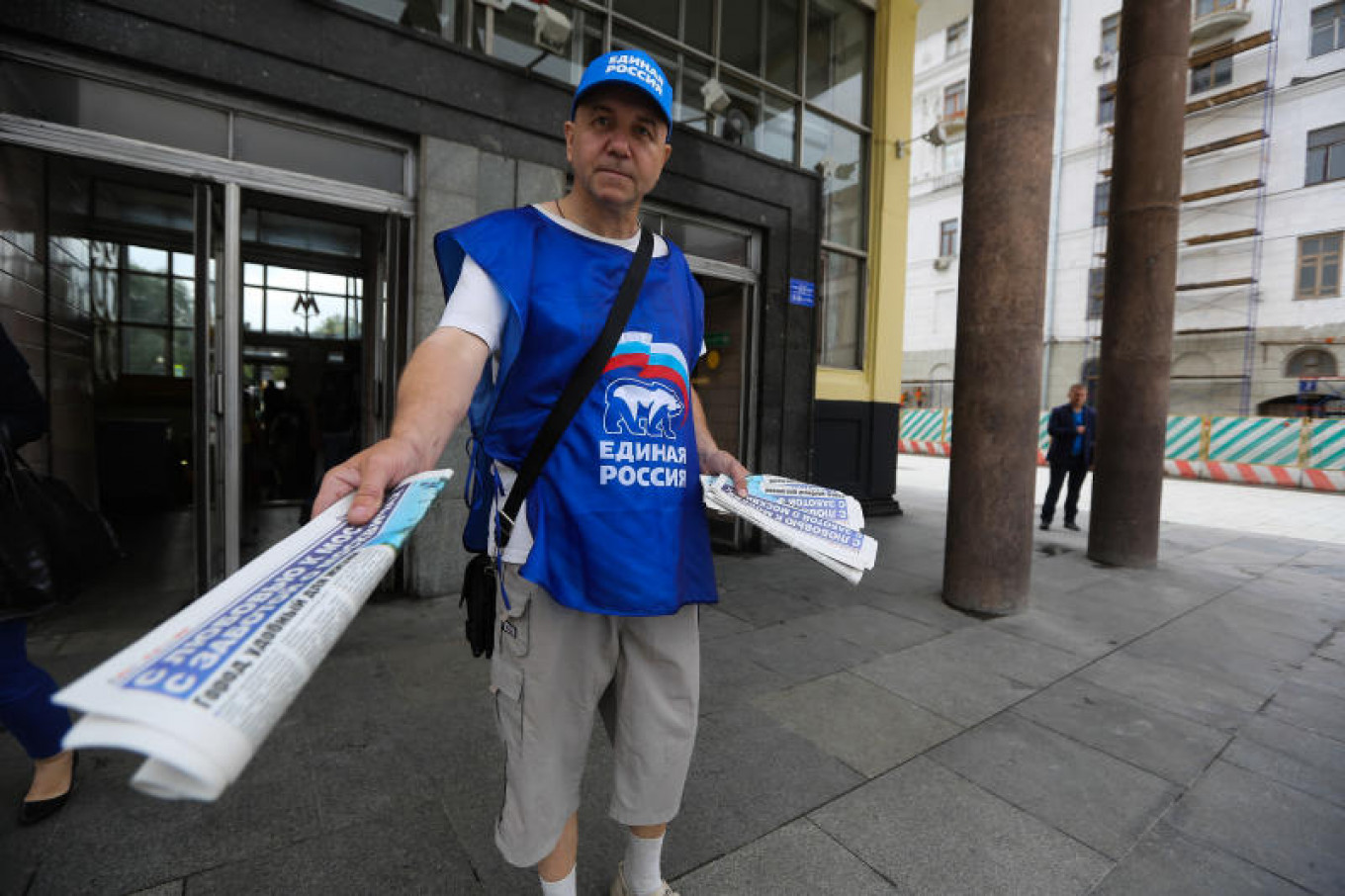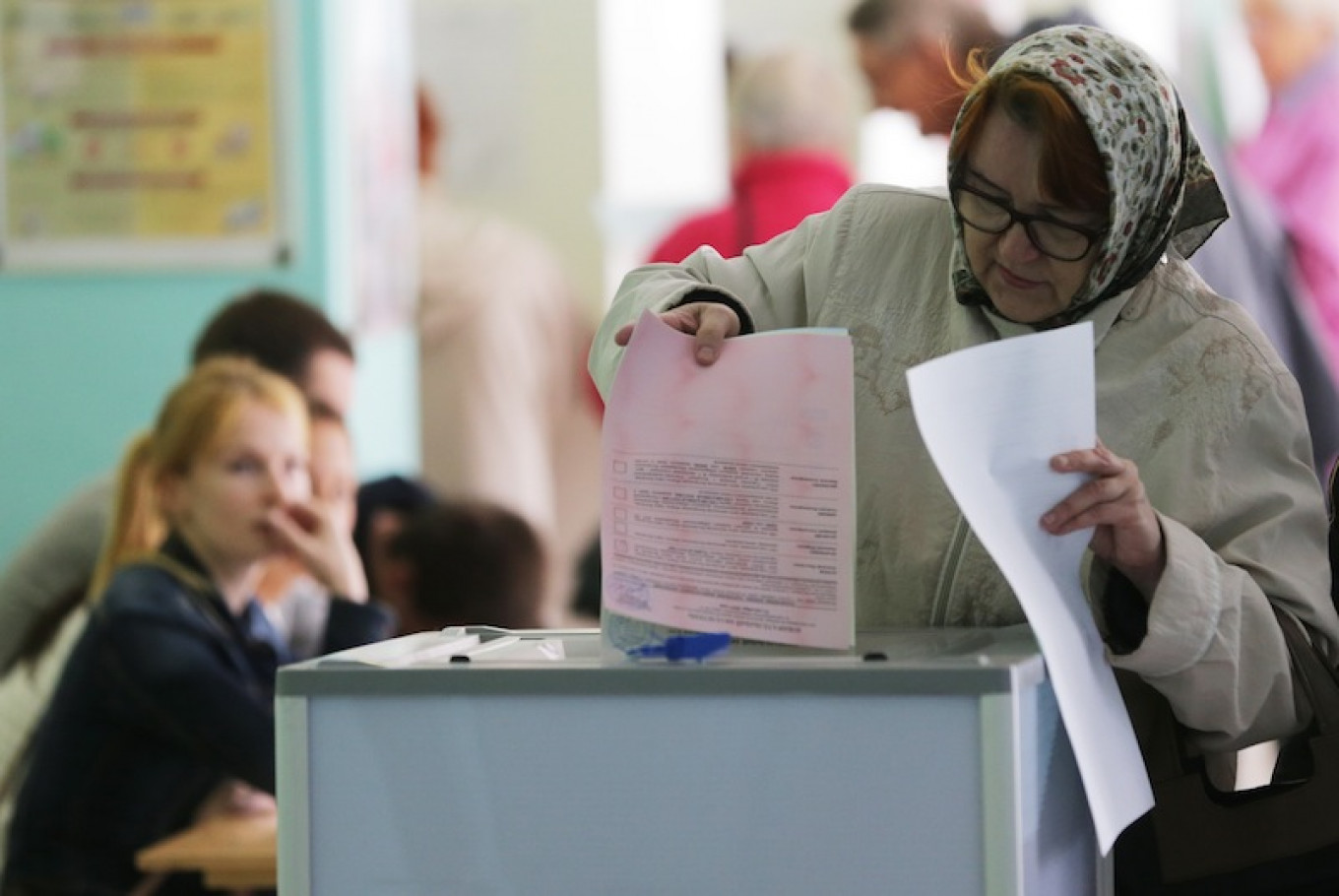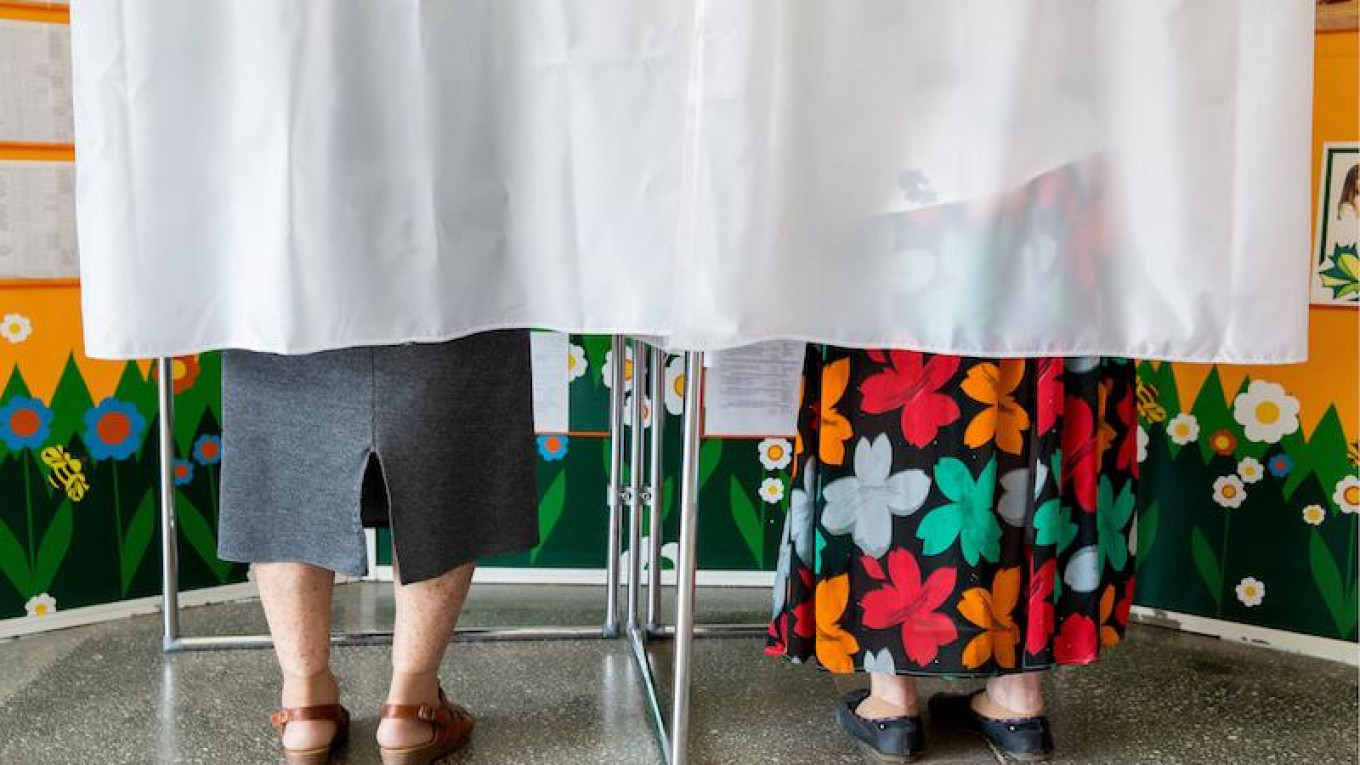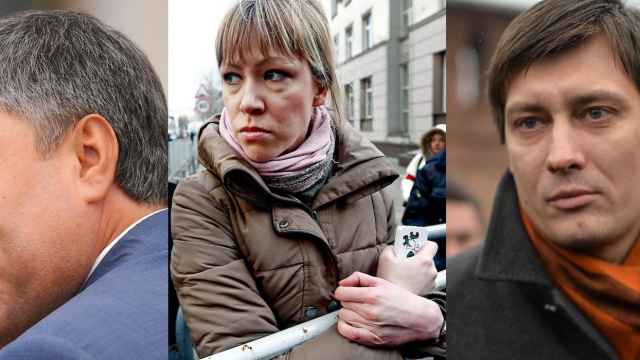Russia’s electoral campaign is in full swing, but you would never guess from the empty concert hall in а southwestern Moscow suburb.
The large space with heavy dark blue curtains would easily seat several hundred, yet only a handful of people have turned up for a meet-and-greet with the local candidate for ruling party United Russia, Dmitry Sablin.
Perhaps it’s for the best since Sablin, a wealthy senator who spearheads the ultra-patriotic anti-Maidan movement, is nowhere to be seen. In his place he has sent a man who identifies himself as a “long-time friend.” Sablin is “somewhere else,” the stand-in says apologetically.
“He’ll get back to you,” he promises residents, jotting down their phone numbers.
A woman’s wrinkled face, wrapped in a floral-patterned headscarf is trembling with frustration. She came to the meeting expecting answers from the ruling party on her pension before the vote on Sept. 18.
“I wanted to look Sablin in the eye,” she says. “And this is what I get: spit in the face. Rubbish! And rubbish is what our next parliament will be, too!”
Russian pensioners have reason to be angry: They’ve been among the hardest hit by Western sanctions and low oil prices. When Prime Minister Dmitry Medvedev, who heads the United Russia party list, was questioned about a decision not to adjust pensions for inflation during a recent visit to Crimea, he gave an answer that has since been widely ridiculed as proof of the Kremlin’s detachment from everyday troubles. “There’s simply no money," he said. "But you hang in there!”
Even with the economic crisis, United Russia’s campaign on the ground is in most places flaccid or absent altogether. The party is expected to emerge the clear victor in the upcoming elections, benefiting from a mix of political apathy among voters and a lineup of celebrity candidates who exploit the patriotism that has been in vogue since the annexation of Crimea.
Sablin’s main selling point is unbridled patriotism. He founded the anti-Maidan movement in response to unrest in Ukraine that toppled the Kremlin-loyal regime there. The group‘s mission is to prevent a so-called “color revolution” in Russia by portraying any form of political dissent in the country as paramount to treason. It has largely worked: Russians have come to equate loyalty to the regime with loyalty to their country.
It doesn’t hurt either that United Russia has been advertised widely as “the president’s party,” making the election less about policy than expressing support for President Vladimir Putin, whose popularity remains sky high.

A Ritual, Not a Choice
Natalya Zorkaya, a researcher at independent pollster the Levada Center, says the Russian attitude toward the election resembles that under Soviet leader Leonid Brezhnev — as a ritual to be carried out, rather than a critical moment of choice.
“People will vote for United Russia, not as the expression of a choice or certain political demands on their part, but as acclamation: an expression of general agreement with the government,” she says.
In recent weeks, Levada has recorded a drop in support for the ruling party, but it is likely to result only in marginally more votes for the clutch of so-called “systemic opposition” parties — the Liberal Democratic Party, the Communist Party and A Just Russia — who are loyal to the Kremlin on all important issues. Not even the most popular independent opposition party, Yabloko, is likely to clear the 5-percent threshold required to enter the State Duma.
The protest movement that emerged after alleged vote-fixing at the last parliamentary elections in 2011 has largely dissipated and is “demoralized,” says Zorkaya. The Kremlin has taken steps to keep it that way, increasing penalties for “unsanctioned meetings” and creating a National Guard force of hundreds of thousands of riot police ready to restore order at Putin’s command.
Steps have also been taken to ensure the upcoming elections are seen as more legitimate and transparent than their 2011 counterpart. This election, only half of the 450 Duma deputies will be taken from countrywide party lists. The remaining half will be voted for directly in single-seat constituencies, giving voters more control over who gets into parliament.
The Kremlin has also appointed a new chief of the Central Election Commission, Ella Pamfilova, a former human rights commissioner with a solid reputation even among many Kremlin critics. Her predecessor had become the face of widespread vote-rigging in the last elections, and his removal seemed to signal the Kremlin is prepared to win the vote fair and square.
Pro-Kremlin Agitators
In Putin’s Russia, however, old habits die hard.
Even with a practically guaranteed pro-Kremlin outcome next Sunday, the competition faces an uphill battle.
On a rainy night a few weeks before the election, opposition politician Dmitry Gudkov, from the Yabloko Party, stands on a makeshift stage in a residential area of drab apartment blocks in northwestern Moscow.
The contrast with his United Russia rival Gennady Onishchenko could not be more stark. Gudkov is young and dynamic, running an army of enthusiastic young volunteers who have been mobilized by his promises to oppose repressive Kremlin policies.
Onishchenko is approaching his 70s, and for years has served as the Kremlin’s chief sanitary inspector. He had a famously politicized approach to health — once warning Russians against attending protests in 2011 to avoid catching the flu. His campaign has been largely apolitical. Staged flashmobs promote the benefits of maintaining a healthy liver, appealing to voters with the slogan: “Make the healthy choice.”
The two seem to be competing in parallel universes. But unlike his competitor, Gudkov does not get airtime on state television or large billboards. His only hope of gathering the 80,000 votes he needs to win his constituency is to win over the district’s residents, one by one.
“This election is already unfair. I would slam Onishchenko in any debate in two minutes, but we don’t have debates,” says Gudkov. “Every poster I put up is torn down minutes later by janitors on the district’s payroll,” he says.
While Gudkov takes questions from residents — why is our currency so weak? How will you help pensioners? — a young, impeccably dressed man is trying hard to create a disturbance in the small crowd.
“So why then are NATO troops on Russia’s border?” he yells. “You’re just America’s pawn!” The tactic is an old one but it works: a brawl ensues as members of the audience start arguing with him, and the attention turns away from the man on the stage.
“That was just a ‘light’ version,” says Gudkov later. “This happens at every meeting.”

‘Enough Cash to Buy a Pistol’
In other places, interference with the opposition goes beyond the presence of pro-Kremlin agitators at rallies.
Within an hour’s drive west from central Moscow, lies the village of Barvikha.You would never guess the country is undergoing a crisis here: Billboards by the side of the road advertise luxury fashion brands “for Milan prices” — and United Russia.
Putin has a dacha nearby, and so do many of his ministers and Sablin, the anti-Maidan senator. Many of them have been outed by anti-corruption politician Alexei Navalny as having built their mansions on public land and avoiding tax. They have a lot to lose if opposition figures gain control over local government.
On Sunday, Sept. 18, the roughly 3,000 Barvikha residents who are eligible to vote will cast their ballot in municipal elections as well as parliamentary ones. Living in close proximity of such wealth and alleged corruption has mobilized Barvikha residents against the establishment, making them an exception to the generally apathetic Russian voters.
Local United Russia officials have sensed the mood and are taking precautions, according to local activists.
In recent weeks, Barvikha has gained several hundred new residents: migrants from the South Caucasus, district officials and even journalists working for local newspapers. Many of them are registered at addresses that don’t exist, or “homes” hidden behind tall fences, says local activist Konstantin Gavrikov, a candidate in the municipal election. In one case, more than 80 people are registered as living in one home, he says. Appeals to local authorities over the violations have been ignored, he says.
“They’re scared,” another local, Vladimir Kuzmin adds. “We won’t allow them to continue stealing.”
Gavrikov and his friends say they have received constant offers to “name your price and your desired position.” And, when the carrot fails, out comes the stick. “I’ve been told nothing can stop them from planting some drugs in my car,” says Kuzmin.
Local residents treat the group like heroes attempting to prevent an election hijacking. Most of the people spoken to say they will vote for Gavrikov for the local municipality and the Communist Party at a federal level. Anything but United Russia — the party of the people in the mansions just up the road.
“They’ve sucked our blood so much that soon they’re going to burst,” says Lyudmila Alexeyeva, a sweet-looking pensioner dressed in purple with a tiger-print cap. She has watched Barvikha’s communal forest disappear behind tall fences of gated communities in what she claims are illegal land deals worth “billions,” while she lives off a monthly pension of 15,000 rubles ($232).
“My pension might not be much,” she says. “But it’ll be enough to buy me a pistol if it comes down to a fight,” she says. Several older women sitting next to her on a wooden bench nod serenely.
Despite the federal government’s best efforts to depict the upcoming elections as fair, a shadow will hang over them.
Several weeks before the vote, the Levada Center, the country's only independent pollster, was labeled a “foreign agent,” after Sablin’s anti-Maidan movement asked the Justice Ministry to investigate its activity. The label would oblige Levada to identify itself as a “foreign agent,” a term with Soviet-era connotations of espionage, when conducting its surveys, and allow authorities to debilitate it with inspections of its finances and work.
It could mean the end of insight into what’s going through Russians’ minds as they tick the box next to United Russia on Sunday.
A Message from The Moscow Times:
Dear readers,
We are facing unprecedented challenges. Russia's Prosecutor General's Office has designated The Moscow Times as an "undesirable" organization, criminalizing our work and putting our staff at risk of prosecution. This follows our earlier unjust labeling as a "foreign agent."
These actions are direct attempts to silence independent journalism in Russia. The authorities claim our work "discredits the decisions of the Russian leadership." We see things differently: we strive to provide accurate, unbiased reporting on Russia.
We, the journalists of The Moscow Times, refuse to be silenced. But to continue our work, we need your help.
Your support, no matter how small, makes a world of difference. If you can, please support us monthly starting from just $2. It's quick to set up, and every contribution makes a significant impact.
By supporting The Moscow Times, you're defending open, independent journalism in the face of repression. Thank you for standing with us.
Remind me later.






